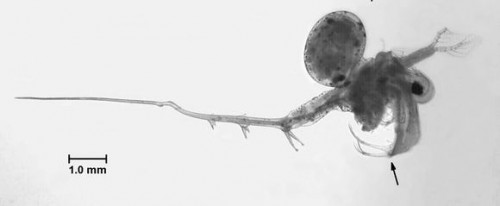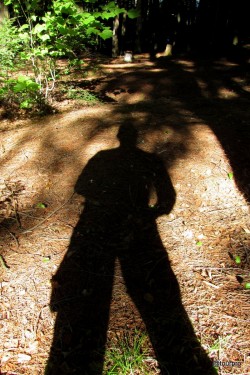Entries Tagged as 'lake george'
Spiny Water Flea Confirmed in Lake George
August 1st, 2012 · No Comments · Adirondack News
New York State Will Work with Partners to Implement Lake Champlain Task Force Recommendations
 The presence of the spiny water flea, an aquatic invasive species, was confirmed in Lake George, the New York State Department of Environmental Conservation announced today.
The presence of the spiny water flea, an aquatic invasive species, was confirmed in Lake George, the New York State Department of Environmental Conservation announced today.
“DEC has worked with its partners on the Lake Champlain Basin Task Force to stop and slow the spread of the spiny water flea,” DEC Commissioner Joe Martens said. “The discovery of spiny water flea in Lake George is not welcome news and DEC’s efforts to slow the spread of this and other invasive species will continue.”
Earlier this week the Lake Champlain Basin Aquatic Invasive Species Rapid Response Task Force released seven recommendations to slow the spread of spiny water flea into Lake Champlain, which includes redirecting the flow of the Champlain Canal into the Hudson River and furthering a feasibility study for a hydraulic barrier between the Champlain Canal and Lake Champlain.
“DEC fully supports the recommendations of the Task Force and will work with the state of Vermont and our other partners to implement the Task Force’s recommendations,” Commissioner Martens said. “Boaters and anglers also have a major role in slowing the spread of invasive species. All boating, fishing and recreation equipment must be cleaned and disinfected, to prevent spreading invasive species to other water bodies.”
The Task Force is made up of representatives from New York state, Vermont and Canada. The Task Force’s report recognizes that the closure of the Champlain Canal and the Glens Falls Feeder Canal is not technically, legally or economically feasible.
The discovery of spiny water flea in Lake George provides another pathway for the invasive species to enter Lake Champlain via the LaChute River. Lake George is not connected to the State Canal System.
The presence of spiny water flea was confirmed through sampling efforts by the Lake George Association on Tuesday, July 31. The samples were taken to the Darrin Fresh Water Institute where four spiny water fleas were identified.
“Right now the Commission’s top priority is invasive species control and management, and we will work with our many partners on determining the extent of this population,” Dave Wick, Executive Director of the Lake George Park Commission, said. “The Commission is currently developing a comprehensive invasive species prevention plan for Lake George, with the goal of preventing any new invasive occurrences from entering the lake.”
The possible presence of the spiny water flea was first reported on Friday, July 27 by an invasive species steward at DEC’s Mossy Point Boat Launch near the north end of the lake. A fisherman had reported having a clump of small organisms on his fishing line after spending time trolling the waters off Mallory Island along the east shore of the lake.
The steward took a sample and provided it to the Lake George Association, who passed it on to the Darrin Fresh Water Institute. After the organisms were identified as spiny water fleas the Lake George Association sampled the waters off Mallory Island and further confirmed its presence.
The invasive pest was previously confirmed in the Great Sacandaga Lake in 2008, Peck Lake in 2009, Stewarts Bridge Reservoir 2010, Sacandaga Lake in 2010 and most recently this summer in the Champlain Canal and Glens Falls Feeder Canal.
Background on Spiny Water Flea
Native to Eurasia, the spiny water flea feeds on tiny crustaceans and other zooplankton that are foods for fish and other native aquatic organisms, putting them in direct competition for this important food source. The tail spines of the spiny water flea hook on fishing lines and foul fishing gear.
Spiny water fleas can impact aquatic life in lakes and ponds due to their rapid reproduction rates. In warmer water temperatures these water fleas can hatch, grow to maturity, and lay eggs in as little as two weeks. Conversely, “resting” eggs of spiny water fleas can remain dormant for long periods of time prior to hatching.
While it is not clear when or how the spiny water flea was introduced into the lakes, it is clear that the initial introduction, and very likely the others as well, were through adult, larvae or eggs being transported to the waters by bait bucket, bilge water, live well, boat, canoe, kayak, trailer or fishing equipment.
Currently, there are no successful means to control or eradicate this and many other aquatic invasive species, so preventing their spread is the only means for reducing their impacts on native aquatic communities. It is very important that boats, anglers and other recreational enthusiasts take precautions to avoid transporting this and other invasive species, particularly after leaving water known to have an aquatic invasive species.
Prevent the Spread of Spiny Water Flea
INSPECT & CLEAN your fishing, boating and other water recreation equipment and gear. Remove all mud, plants and other organisms that might be clinging to them when leaving waters, especially those that are known to contain an aquatic invasive species.
DRY your fishing and boating equipment before using it on another body of water. Drying is the most effective “disinfection” mechanism and is least likely to damage sensitive equipment and clothing. All fishing and boating equipment, clothing and other gear should be dried completely before moving to another body of water. This may take a week or more depending upon the type of equipment, where it is stored and weather conditions. A basic rule of thumb is to allow at least 48 hours for drying most non-porous fishing and boating gear at relative humidity levels of 70 percent or less.
DISINFECT your fishing and boating equipment if it cannot be dried before its use in another body of water. Disinfection recommendations vary depending on the type of equipment and disease of concern. Be particularly aware of bilge areas, live wells and bait wells in boats. These areas are difficult to dry and can harbor invasive species.
See the DEC website for more information on invasive species and how you can stop their spread: Nuisance & Invasive Species.
USGS Spiny Water Flea Fact Sheet: <a href=”http://nas.er.usgs.gov/queries/FactSheet.aspx?speciesID=162″ title=”spiny water flea (Bythotrephes longimanus) – FactSheet”>spiny water flea (Bythotrephes longimanus)</a>.
Tags: dec·invasive species·lake george
DEC Make Arrest After Disturbance at Campground
June 20th, 2012 · No Comments · Adirondack News
 On the weekend of June 9, DEC Environmental Conservation Police made one arrest and issued numerous tickets related to an incident at the DEC Hearthstone Campground in the Town of Lake George, Warren County.
On the weekend of June 9, DEC Environmental Conservation Police made one arrest and issued numerous tickets related to an incident at the DEC Hearthstone Campground in the Town of Lake George, Warren County.
Anthony McPhillips, 21, of East Greenbush, NY, was charged with disorderly conduct, failure to register as a camper, failure to comply and failure to observe quiet hours, all violations. McPhillips faces total maximum possible penalties of $1000 in fines and up to 60 days in jail.
In the same incident, 26 youths from Rensselaer County, ranging in age from 16 to 20 were issued appearance tickets for underage possession of alcohol. The violation has a maximum possible penalty of $250 in fines and up to 15 days in jail.
Four of the youths received additional charges of violations:
- One was charged with failure to register and failure to comply, for a combined maximum possible penalty of $750 and 45 days in jail;
- Another was charged with littering on state land, for a combined maximum possible penalty of $750 and 45 days in jail; and
- Two others were charged with possession of marijuana, for a combined maximum possible penalty of $500 and 30 days in jail for each of the defendants.
All of the tickets were returnable to the Town of Lake George Court.
DEC warns high school graduates and others that the possession of alcohol by underage persons is prohibited at DEC campgrounds and on all State lands.
Tags: booze·crime·dec·lake george·warren county







